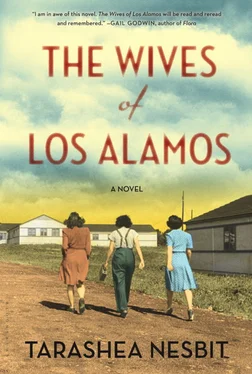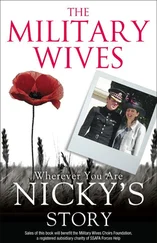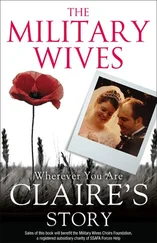WE SAW HORSES and coyotes, and for the group of us that rode outside the fence together, greater adventures. We saw mountain lions and snakes and once, at the top of the ridge, we saw a man with binoculars studying the buildings of our town below. One of us called, Spy! and he looked at us and ran. We galloped toward him into the rough rock and it proved too much for the horses. When Betty drew a revolver we all exclaimed and while we were exclaiming the man went out of view, but Betty was nonchalant and said, I take this everywhere with me , and put her gun back under her shirt.
WE REPORTED THE incident to the Army and told everyone what happened; as far as we know he was never caught. And though we talked of who might be a spy, the real spy among us was someone we never suspected. He did not come up in our conversations, except to say he was quiet. Instead, we dined together on Sunday evenings; he seemed to enjoy playing murder mystery games and charades like the rest of us; he did not talk too much and he listened to us well beyond the limits of our husbands’ patience. We thought he was just shy. He babysat our children while we went to dinner at the Director’s house; he gave us new records for Christmas because we had complained we did not have enough to dance to. Our husbands described him as bright in the Lab. We had liked him very much, except for Marge who had said, He sits in the corner at parties and doesn’t laugh but has that high-pitched giggle. Gives me the chills.
MANY OF US had no children when we arrived, or toddlers, but some of us were older, and when we arrived our children were nine and now they were eleven. Or we arrived and they were one of the few thirteen-year-olds and now they were fifteen. It was terrifying.
OUR NELLS PLAYED basketball in the gymnasium; our Timothys told the Army private who was also their Phys Ed teacher, when reprimanded for throwing stones, Do you know who my dad is? We hoped he said he didn’t care. Our Jims built tree houses and hid ham radios from the guards in the woods.
WE WANTED OUR children’s school to have everything: piano, horseback riding, French, physics, tennis. Or we thought they would be overindulged and we were relieved that they were learning side by side with children of carpenters, technicians, and truck drivers, and we were happy they were learning how to cut wood, make fires, and make do with one pair of boots.
OUR MICHAELS AND Lindas put Limburger cheese in the desk drawers of teachers they did not like. Our Janets refused to march as the WACs demanded. Our Betties and Jo Anns square-danced in gingham dresses across Fuller Lodge. On Friday nights they loved to go to the mess hall for steak dinners because on steak dinner nights our husbands, their fathers, who were less often coming home for dinner, would be there.
OUR TEENAGE DAUGHTERS had left behind their friends and their boyfriends, our teenage daughters smiled too long at the soldiers and we warned the officers to keep an eye on their men and we warned our daughters we were watching them. Our teenage daughters read magazines that taught them how to look from under their lashes. Our teenage daughters skipped classes to kiss the soldiers, who were more protective of them than we would have imagined, and our teenage daughters felt guilty in ways we hoped they would. Our daughters knew they could not bring these soldiers home. And though they necked with the young single scientists, too, the young scientists did not take them seriously the way the soldiers did. Our daughters with their bodies in the shapes ours once were, with their defiance, with their hunger, with their longing. We took away their passes off the Hill.
OUR CHILDREN WERE mad at their fathers for telling them nothing, for disappearing into the Tech Area, and they spoke unkindly to their fathers, saying, Hi , or, Nice to see ya , without looking up, and under their breath they added, finally . And sometimes our husbands slammed their fists hard on the table, which shook the mashed potatoes.
OUR TEENAGERS WERE better than us at outfoxing the guards. They bribed the military police with beer and stole Army jeeps and some boys rolled them off the steep edges of the canyons. And even though we thought we were smart, holding on to our daughters’ identification so they could not sneak off the Hill at night, we did not know that some of our teenage daughters just hid in the trunk of someone else’s car and quickly they were off to Santa Fe, to Española, to someplace in the desert where they could do exactly what they wanted until daybreak.
THE COOLNESS OF spring turned into the sweat-beading heat of summer, and we felt the climax coming but we did not know what it would be or when it would happen. We had been here a year, some of us two, and our brothers, nephews, or cousins had been in the war four years. In April, Hitler committed suicide in a bunker beneath the rubble of Berlin. And when Germany surrendered a few days later, we were a town of parades and cowbells and cheering. Wouldn’t the end of the European theater stop the work at Los Alamos?
IT WAS QUICKLY apparent that no, the work here was not done, and our husbands were gone for even longer hours. The anxiety we had about the war in Europe was transferred to the Pacific. We refocused our attention to the fits and starts of progress against Japan. It was all the same news practically—a little forward, a little behind. Our first nieces and nephews were born without us and our parents wrote asking if we could visit for a short vacation. The answer was always, sadly, No .
WE FELT OUR husbands’ agitation in how they closed doors or walked across the living room. The sighs they made while opening the refrigerator, the curses they gave to the shower handles. There was nothing we could do to comfort them, and their abrupt movements caused our own necks to tighten. We had no outside network—friends from another town, family members, ladies from a watercolor class—to diffuse the growing stiffness in our bodies, so we relied on one another, the other wives.
IN THE AFTERNOONS the temperature rose to a hundred. We became testy. It was Hurry! Hurry! Hurry! from the WACs in the checkout lane, at the post office, in the school yard. We all moved at a faster pace as we walked and therefore we dropped things—a breakfast plate slid from our hands and grazed our toes. Our vocabulary of curse words expanded.
ONE WIFE, BEATRICE, left to visit her parents in Kansas because her husband told the General her father was dying. She told us her husband was sending her away but she did not know why—she said her father was in fine health.
WHEN OUR HUSBANDS came home their eyes would meet ours but be someplace far, far away. Their voices were stern and they said, Make me another drink , or, What did you do that for? And they no longer—if we are to be honest—they no longer made love to us. We slipped off our clothes before turning off the lights, we glanced back at them over our shoulders, we pressed our breasts against their turned backs and many of them said nothing, did not even move. Or they said, Not tonight . We lay on our backs in the dark, embarrassed, counting our breaths, not falling asleep, worrying that they had taken a lover.
WE THOUGHT ABOUT the female scientist who played the clarinet and could not sit still and whose girdle was too tight. We did not have access to hair color and we were now growing gray, but we thought it might do us good to cut back on sweets. We did not talk to our girlfriends about this. We thought of Jane, who was perpetually pregnant, who did not seem to have this problem, who arrived at our doors glowing in the morning saying, So sorry I’m late!
Читать дальше












